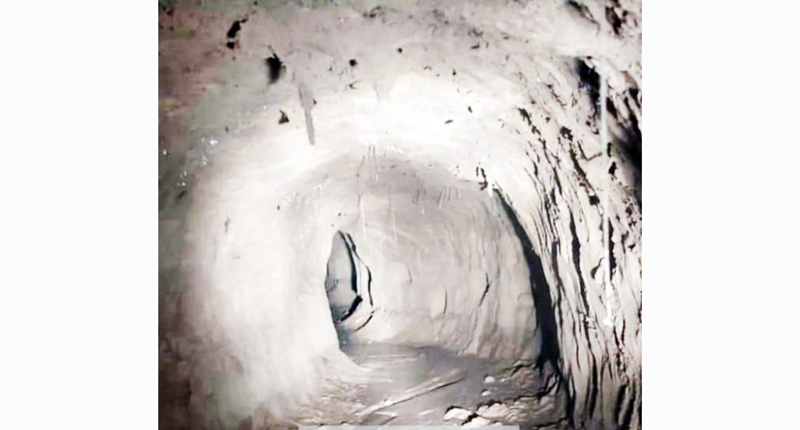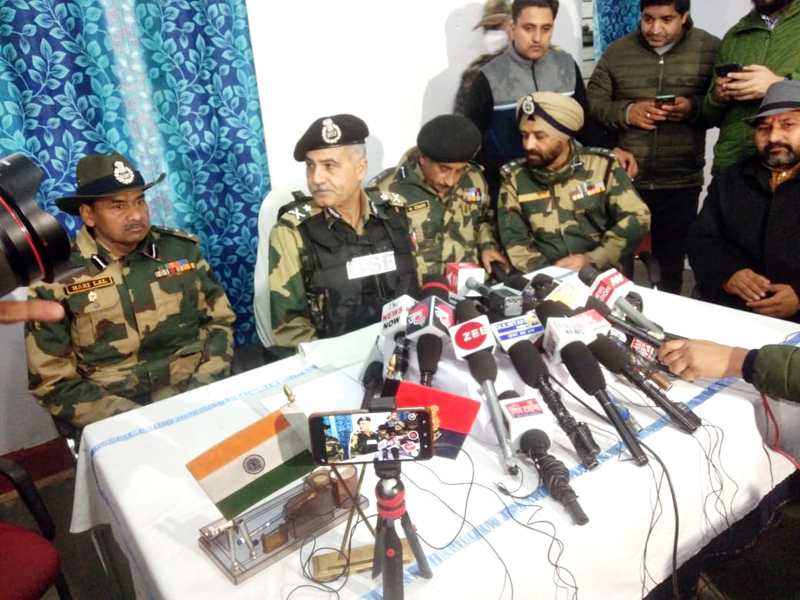
Dug 6-8 years back, may have been used by militants many times
*Pak establishment involved in construction: IG BSF
Sanjeev Pargal
JAMMU, Jan 23: The Border Security Force (BSF) today detected yet another tunnel constructed along the International Border and, as usual, having origin on Pakistan side, at village Pansar in Hiranagar sector of Kathua district which, significantly, was six to eight years old and might have been used for infiltration by a number of militants.
This was third tunnel detected by the BSF on the International Border in three months, fourth in six months in Samba, Hiranagar and Kathua areas and 10th in the Jammu region, official sources told the Excelsior.
Click here to watch video
The tunnel was 150 meters long, 30 feet deep with two to three feet diameter and opens between Border Post Nos. 14 and 15 at village Pansar located on the International Border in Hiranagar tehsil of Kathua district. Across the border are Pakistani Border Out Posts of Abhiyal Dogra and Kingre-de-Kothe in Shakargarh district, which is known as hub of Lashkar-e-Toiba (LeT) and Jaish-e-Mohammed (JeM) militants.

“The tunnel is proper engineering effort and couldn’t have been constructed without the support of Engineering Unit of Pakistan army,” sources said, adding tunnel appeared to be six to eight years old and possibility that it might have been used by the militants for infiltration into the Indian territory many times, can’t be ruled out at this stage but this aspect will be part of intense investigations being carried out by the BSF.
The tunnel was detected as part of hectic anti-tunneling exercise initiated by the BSF all along the International Border in Jammu, Samba and Kathua districts after four militants were killed at Nagrota on Jammu-Srinagar National Highway on November 19 last year amid reports that they had infiltrated from the border between Samba and Hiranagar sectors.
Prior to that also, police had intercepted militants at Nagrota and Jhajjar Kotli on the highway and the Over Ground Workers (OGWs) transporting them to Kashmir had confirmed that the militants had intruded from the International Border. The OGWs had also disclosed that they had shifted more militants from the International Border to Kashmir.
“The tunnel detected today and prior to this at Bobiya in Samba and other places on the International Border especially four during last six months appeared to have been used by the militants for infiltration into the Indian side from Pakistan,” sources said.
Possibility of more tunnels having been dug by the Pakistan army to facilitate infiltration of the militants isn’t ruled out and the anti-tunneling drive initiated by the BSF would continue.
Describing the tunnel as “huge”, sources said it had been dug in such a way that it was quite simple and easy for the militants to infiltrate from Pakistan to this side of the border.
“The militants could easily walk through the tunnel and they needn’t to crawl,” sources said, adding it wasn’t possible to construct such tunnels without the help of Pakistan army’s Engineering Regiment.
It is pertinent to mention here that the BSF had shot down a Pakistani Hexacopter carrying load of weapons and ammunition in the same area in June last year. BSF Assistant Commandant Vinay Prasad was martyred near the area in January 2019 in sniper shot by the Pakistani Rangers while an infiltration attempt by the armed militants was also foiled near the site of tunnel in November 2019.
Inspector General of BSF, Jammu Frontier, N S Jamwal told reporters in Hiranagar that there were inputs from intelligence agencies about the existence of a tunnel in the Pansar area and possibility of infiltration attempt ahead of Republic Day.
“Accordingly our anti-tunneling campaign was intensified which led to the detection of the tunnel,” Jamwal, who rushed to the spot soon after the tunnel was detected, said.
He added that Pakistan has constructed this tunnel from the zero line and it is about 150 meter long with 25 to 30 feet depth and two to three feet diameter so that one can crawl easily to pass through this tunnel.
“It is a big achievement and full credit goes to the troops on the ground and the intelligence agencies, which are providing regular inputs to us,” he said, highlighting the role of Pakistan in the construction of tunnels to facilitate infiltration of terrorists into India.
“The whole Pakistani establishment is involved as nobody can come close to zero line without the knowledge of Pakistani Army, Rangers and ISI. The tunnel was constructed with an engineering effort and its construction demonstrates that a thought process was involved wherein the experts were involved to study and check the soil so that the tunnel can sustain and do not collapse,” Jamwal said.
The Jammu BSF chief said such a type of construction is not possible without the support of the administration.
“This is a difficult and sensitive area. This is the same area where we shot down a hexacopter in June last year. Two years earlier, there was a sniping incident from Pakistan and four to five years back, a fire assault also took place on BSF troops. It seems they have started the construction of the tunnel during that time,” the IG BSF said, adding in November 2019, the force fired after noticing movement of terrorists and neutralized their bid and forced them to flee back.
Jamwal said there was no specific input with regard to January 26 but the BSF is always alert and fully prepared to safeguard the borders of the country, especially during the National Days.
“Border is always challenging and there is regular firing (from Pakistan). Our effort is to improve our security grid as much as we can,” he said, adding “we have full Government support”.
Responding to a specific question about intelligence inputs suggesting presence of three to four terrorists in a launching pad opposite Shakargarh to sneak into this side and carry out a strike on Republic Day, he said “the launch pad you are talking is about 3 to 4 kms from this BOP and we have information and we are alert (to the threat).”
“There are five to six launch pads on the Pakistani side between Shakargarh and Sialkot which are both notorious. This area (Hiranagar sector) is very sensitive because the (Jammu-Pathankot) highway is very close and so the vital installations dotting the road which usually are terror targets,” the BSF officer said.
He said Pakistani side has deliberately kept their side of the border unattended and are not even allowing their farmers to come closer which are part of a “well thought out strategy to push infiltrators”.
Asked about the growing threat of infiltration attempts along IB after snowfall led to closure of passes on the Line of Control (LoC), Jamwal said BSF is not taking any chances and is fully alert as attempts of infiltration were detected along LoC despite snowfall.
Responding to another question about the possibility of more tunnels, the IG said the alertness of the BSF and stepped up anti-tunneling operation led to the detection of two tunnels this month besides foiling attempts by Pakistan to smuggle weapons through drones.
“This tunnel seems an old one which was evident from the recovery of gunny bags with Pakistani markings. The special drive will continue,” he said.
On January 13, a 150-metre-long tunnel was detected in Bobiya village in the same sector.

